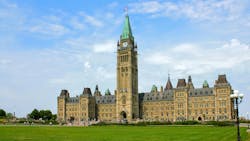Canadian federal government makes investments in expanded rural transit, planning for rural zero-emissions transit
The Canadian federal government is investing C$8 million (US$5.8 million) to help rural Albertan communities assess their public transit needs and purchase transit vehicles along with supporting infrastructure.
Part of the funding will support Leduc Transit, with funds being used to purchase seven local buses and one commuter bus to replace the current fleet and expand service.
Funding will also be spent to purchase accessible, mini and standard-sized diesel buses for fixed-route service between Red Deer County and the Hamlet of Gasoline Alley. The town of Whitecourt will also procure additional buses and supporting infrastructure with the federal funding.
"Working with our partners and investing in tailored transit solutions is paramount for our government to ensuring that communities across Alberta and Canada are well connected. The projects announced today will help purchase more vehicles for service and facilitate research and planning to better understand local transit needs, ultimately improving public transportation for rural Albertan communities,” said Minister of Emergency Management and Community Resilience Eleanor Olszewski.
Bow Valley Regional Transit Services Commission, the county of St. Paul, Drumheller, Stoney-Nakoda First Nation, town of Olds and Westlock County will use the funding to complete transit and feasibility studies and exploratory research assessing demand and existing routes and services. Once completed, studies will help determine how best to meet the public transportation needs of rural communities and facilitate long-term transit planning.
Canadian government investing in zero-emission transit
The town of Moose Jaw, Saskatchewan, is also conducting similar strategy development for zero-emissions transit with a combined investment of C$152,180 (US$110,200) between the Canadian federal government through the Zero Emission Transit Fund and the city of Moose Jaw.
The government says the funding will help the city to identify barriers and plan approximately for the environmental, economic and technological considerations with the electrification of its fleet.
“On behalf of Moose Jaw City Council, we thank the government of Canada for this significant investment. The zero-emissions transit strategy will be a vital step forward in shaping the future of transit in Moose Jaw,” said Moose Jaw Mayor James Murdoc.
The federal government is investing C$121,744 (US$88,160), and the city of Moose Jaw is contributing C$30,436 (US$22,040).
About the Author
Noah Kolenda
Associate Editor
Noah Kolenda is a recent graduate from the Craig Newmark Graduate School of Journalism with a master’s degree in health and science reporting. Kolenda also specialized in data journalism, harnessing the power of Open Data projects to cover green transportation in major U.S. cities. Currently, he is an associate editor for Mass Transit magazine, where he aims to fuse his skills in data reporting with his experience covering national policymaking and political money to deliver engaging, future-focused transit content.
Prior to his position with Mass Transit, Kolenda interned with multiple Washington, D.C.-based publications, where he delivered data-driven reporting on once-in-a-generation political moments, runaway corporate lobbying spending and unnoticed election records.

